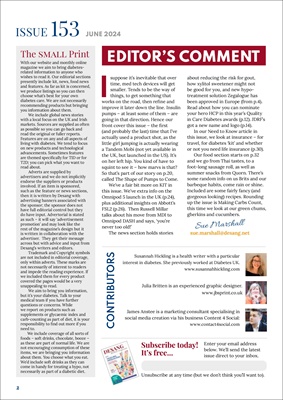
2
ISSUE 153 Talk about having a choice!
I know it's been a jolly long
time since most of us have
had the choice to go on any
CGM sensor, let alone end up with a
choice. But as we go on, there's more
choices coming up with sensors
being adapted and amended both
due to user and HCP feedback, but
also to focus in on slightly different
populations of people with diabetes.
On p.16 we therefore take a little
look at the newest, Dexcom ONE+.
The latest version is modelled around
the needs of people with Type 2
diabetes. Dr Rose Stewart explains
why, and why it's needed. Also
download a report,
I've repeated a 'call to action' for
people with Type 2 on basal insulin
to be part of an eight-month trial on
an Abbott FreeStyle Libre 3 sensor,
with medical oversight. If you qualify,
please apply. If it applied to me, I'd
jump at it. Participation could mean
helping to pave the way for much
EDITOR'S COMMENT
better control for many people with
Type 2 diabetes going into the future.
Lots of news, as ever (starts
on p.4). Download Diabetes UK's
Reverse the Trend report. And/or
download DRWF's Eye Health advice
PDF. CamAPS gets FDA approval.
Medtronic and Arecor partner to
create ideal insulin for insulin pumps.
Olive oil - can regular ingestion delay
mental decline? Apparently so!
Food news from p.26 with Making
Carbs Count this time around having
been written by Type 1 diabetic
and qualified nutritionist May
Knight about the pros and cons of
'smoothies'. Whether purchased
from cafes or supermarkets or
made at home, she sets out some
guidelines to buy (or make) ones that
are actually healthy (most aren't as
healthy as they claim to be).
sue.marshall@desang.net
Sue Marshall
Enter your email address
below. We'll send the latest
issue direct to your inbox.
Unsubscribe at any time (but we don't think you'll want to).
JUNE 2024
The small Print
With our website and monthly online
magazine we aim to bring diabetesrelated
information to anyone who
wishes to read it. Our editorial sections
presently include kit, news, food news
and features. As far as kit is concerned,
we produce listings so you can then
choose what's best for your own
diabetes care. We are not necessarily
recommending products but bringing
you information about them.
We include global news stories
with a local focus on the UK and Irish
markets. Sources are supplied as often
as possible so you can go back and
read the original or fuller reports.
Features are on any and all aspects of
living with diabetes. We tend to focus
on new products and technological
advancements. Sometimes features
are themed specifically for T1D or for
T2D; you can pick what you want to
read about.
Adverts are supplied by
advertisers and we do not implicitly
endorse the suppliers or products
involved. If an item is sponsored,
such as the feature or news sections,
then it is written by Desang with
advertising banners associated with
the sponsor; the sponsor does not
have full editorial control but they
do have input. Advertorial is stated
as such - it will say 'advertisement
promotion' and may look like the
rest of the magazine's design but it
is written in collaboration with the
advertiser. They get their message
across but with advice and input from
Desang's writers and editors.
Trademark and Copyright symbols
are not included in editorial coverage,
only within adverts. These marks are
not necessarily of interest to readers
and impede the reading experience. If
we included them for every product
covered the pages would be a very
unappealing to read.
We aim to bring you information,
but it's your diabetes. Talk to your
medical team if you have further
questions or concerns. While
we report on products such as
supplements or glycaemic index and
carb-counting as part of diet, it is your
responsibility to find out more if you
need to.
We include coverage of all sorts of
foods - soft drinks, chocolate, booze -
as these are part of normal life. We are
not encouraging consumption of these
items, we are bringing you information
about them. You choose what you eat.
We'd include soft drinks as they can
come in handy for treating a hypo, not
necessarily as part of a diabetic diet.
Susannah Hickling is a health writer with a particular
interest in diabetes. She previously worked at Diabetes UK.
www.susannahhickling.com
Julia Britten is an experienced graphic designer.
www.jbsprint.co.uk
James Anstee is a marketing consultant specialising in
social media creation via his business Content 4 Social:
www.contact4social.com